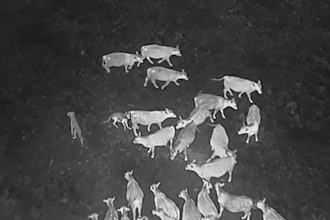
CHAMPAIGN, Ill. — The College of Agricultural, Consumer and Environmental Sciences at the University of Illinois Urbana-Champaign this week unveiled plans for a global center for food and agricultural communications as part of the National Ag Day celebration.
“Illinois is uniquely positioned with both a leading agricultural industry and one of the largest urban centers to be a catalyst for new insights that will benefit food systems around the world,” said College of ACES Dean Germán Bollero.
Named after the storied agricultural communications pioneer and Illinois professor emeritus, the James F. Evans Global Center for Food and Agricultural Communications will continue to advance excellence in this space through outreach, professional development, research, convenings, and degree programs.
To kickstart the more than $5 million fundraising campaign that is required to establish the Evans Center, a sizable donation has been made in Evans’ name by an anonymous alumnus.
An initial phase for the Evans Center will start this year in a dedicated space adjacent to a new learning innovation lab being constructed in the lower level of the College of ACES Library, Information and Alumni Center, commonly known as the Funk Library.
“I’m looking forward to seeing students working alongside experts from diverse backgrounds to tackle the most pressing communications challenges of today’s global food systems,” said Anna Ball, associate dean of academic programs in the College of ACES.
Momentum for the Evans Center builds on the strength of the agricultural communications undergraduate and graduate programs, which have been revised over the past two years with broad industry input to help students prepare to enter the workforce. Three pillars guide the program: skill development, global awareness, and critical thinking.
Needs assessments by Illinois and the International Federation of Agricultural Journalists have shown significant communications demand in areas such as strategic and critical thinking, knowledge mobilization, multi-media production processes, and leadership training.
Industry professionals, alumni, faculty, and students have identified priorities for the Evans Center including professional development events, skills training, visiting global agricultural journalist programs, unbiased media research, executive seminars, consumer outreach efforts, and more.
“We have been talking with potential stakeholders to ensure we have the best possible vision for what the center needs to make an impact globally,” Ball said. “Ultimately, the Evans Center will find new and better ways to advance food and agricultural communications to create a better, more sustainable future for producers and consumers.”






















